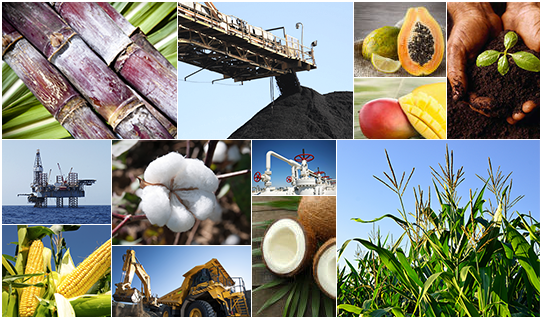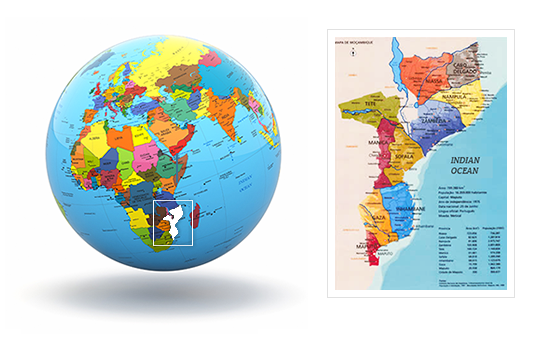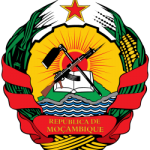WHY INVEST
RICH IN NATURAL RESOURCES
Mozambique has an abundance of natural resources: fertile plains that favor agriculture, large rivers – a source of hydroelectric power –, minerals, iron, extensive reserves of natural gas, and fossil energy resources such as coal. In addition to these resources, Mozambique also has 2700 km of coastline and an ocean rich in fish and shellfish.
The country is also very rich in minerals. Large reserves of coal have been found, and coal began to be exported in 2012. There are also deposits of graphite, bauxite, gold, and gemstones. Another resource of enormous economic importance is natural gas. Mozambique has huge reserves of untapped natural gas.


AGRICULTURE & WATER RESOURCES
Agriculture is currently the most important and prioritized economic activity. The Mozambican territory provides vast lands which are excellent for agriculture, but only a small part is currently used for this purpose. The main agricultural products are cotton, sugar cane, tea, tobacco, sisal, cashew nuts, copra (coconut flesh), and cassava.
From north to south, the country is crossed by large rivers (the Zambezi being the largest). These rivers represent a great value and potential for agriculture (irrigation), as well as for the supplying of hydroelectric power. The total capacity of this energy source is estimated at 16,000 megawatts. Water resources in Mozambique are vast and virtually untapped.
MINERALS & MINING
Mozambique has an abundance of natural resources: fertile plains that favor agriculture, large rivers – a source of hydroelectric power –, minerals, iron, extensive reserves of natural gas, and fossil energy resources such as coal. In addition to these resources, Mozambique also has 2700 km of coastline and an ocean rich in fish and shellfish.
The country is also very rich in minerals. Large reserves of coal have been found, and coal began to be exported in 2012. There are also deposits of graphite, bauxite, gold, and gemstones. Another resource of enormous economic importance is natural gas. Mozambique has huge reserves of untapped natural gas.


FLORA, FAUNA & TOURISM
Mozambique has a spectacular oceanic coastline, islands with coral reefs, vast plateaus, plains, and tropical jungles. Elephants, buffaloes, lions, and giraffes can all be observed in the national parks of Mozambique - ideal for the tourist who demands quality and uniqueness. Thanks to its unspoiled nature, (eco) tourism in Mozambique is a sector with enormous economic potential.
From north to south, the country is crossed by large rivers (the Zambezi being the largest). These rivers represent a great value and potential for agriculture (irrigation), as well as for the supplying of hydroelectric power. The total capacity of this energy source is estimated at 16,000 megawatts. Water resources in Mozambique are vast and virtually untapped.
WATER RESOURCES
From north to south, the country is crossed by large rivers (the Zambezi being the largest). These rivers represent a great value and potential for agriculture (irrigation), as well as for the supplying of hydroelectric power. The total capacity of this energy source is estimated at 16,000 megawatts. Water resources in Mozambique are vast and virtually untapped.
FLORA & FAUNA
Mozambique has a spectacular oceanic coastline, islands with coral reefs, vast plateaus, plains, and tropical jungles. Elephants, buffaloes, lions, and giraffes can all be observed in the national parks of Mozambique - ideal for the tourist who demands quality and uniqueness. Thanks to its unspoiled nature, (eco) tourism in Mozambique is a sector with enormous economic potential.

NATURAL RESOURCES
Mozambique has an abundance of natural resources: fertile plains that favor agriculture, large rivers – a source of hydroelectric power –, minerals, iron, extensive reserves of natural gas, and fossil energy resources such as coal. In addition to these resources, Mozambique also has 2700 km of coastline and an ocean rich in fish and shellfish.
Agriculture is currently the most important and prioritized economic activity. The Mozambican territory provides vast lands which are excellent for agriculture, but only a small part is currently used for this purpose.
The country is also very rich in minerals. Large reserves of coal have been found, and coal began to be exported in 2012. There are also deposits of graphite, bauxite, gold, and gemstones. Another resource of enormous economic importance is natural gas. Mozambique has huge reserves of untapped natural gas.

DEMOCRAPHICS
Mozambique has a population of about 30 million people. The population is young and rapidly growing. Since 1960, the country's population nearly quadrupled. A third of the population is concentrated in cities. Indian and European communities, the latter mostly of Portuguese origin, can be found through out the country.
MAIN LANGUAGES
Portuguese is the official language of the country. Besides Portuguese, there are several native languages, spoken by large numbers of the population. These languages are protected by the Constitution, among others: Xitsonga, XiChope, Bitonga, XiSena, XiShona, ciNyungwe, eChuwabo, eMacua, eKoti, Elomwe, ciNyanja, Ciyao, XiMaconde and Kimwani.
MAIN RELIGIONS
Mozambique is a multi-religious country. About 56% of the population is Christian, 18% are Muslim, 7% have other religions (mostly animism), and about 19%, according to the 2007 census, declared having no religion.
HISTORY & POPULATION
Mozambique has a history of over 2000 years. The first people to settle in the present territory were the Bantu, who from the tenth century onward formed several states. The empire of Mwenemutapas was one of the main Bantu states.
Because of Mozambique's extensive coastal line, most contacts between the Bantu states and other foreign kingdoms were maritime contacts, such as from the Arabic Peninsula and the Indian subcontinent. The first Portuguese arrived in Mozambique in the sixteenth century.
After the division of Africa by European colonial powers in 1885, Mozambique became a Portuguese colony. About a century later, following an anti-colonial war, Mozambique became independent. The date of independence, June 25, 1975, is celebrated as the country's most important holiday.


POLITICS & POLICY
Mozambique is a presidential republic. The government is appointed by the President. The current President of Mozambique is Filipe Jacinto Nyusi. The National Assembly (Parliament of Mozambique) consists of 250 members, who are elected every five years. The President is also elected every five years.
ECONOMY
Since the turn of the century, Mozambique's economy has grown rapidly, and offers great potential for investment, particularly in agriculture, mining, tourism, and infrastructure. The Gross Domestic Product (GDP) for 2011 is estimated at U.S. $ 14.27 billion; GDP growth for 2011 is 7.1%.
Currently, the main sector of the Mozambican economy is agriculture. However, the Mozambique government strongly encourages foreign investment, which has strengthened the sectors of raw materials, tourism, and infrastructure. The Mozambique government also implemented a program to reduce poverty in the country, aimed at creating a sustainable economy. The "boom" of the Mozambican economy lately attracts many immigrants, including from European countries.

COURTESY VISA
APPLICATION OVERVIEW
A Courtesy Visa is granted to foreigners invited by public Institutions in order to carry out activities of interest to the State.
GENERAL CONDITIONS
Citizens residing in Belgium, The Netherlands, and Luxembourg may request entry visas for Mozambique at the Embassy of Mozambique located in Brussels – Belgium. Citizens of different nationalities working in the EU institutions as well as in international organizations based in these countries can also apply for visas at this Embassy.
REQUIREMENTS
Applicants are to gather all documents, as specified in this section, items 1 to 6, ensuring good visibility, and submit them to the embassy. This can be done directly at the embassy or via registered mail.
NON COMPLIANCE
Applicants who have been expelled, forbidden to enter the Republic of Mozambique, or declared "persona non grata" do not comply with the General Conditions for obtaining entry visas.
VISA EXEMPTIONS
Nationals holding passports from the SADC countries do not require visas to enter the Republic of Mozambique. This exemption allows foreign nationals to remain in the country for a period that cannot be extended and cannot exceed 90 days.
SUBMISSION
The Embassy is open to the public every weekday from 9:30 to 13:00, except on Mozambican and Belgian holidays. Please refer to the contact page for more information on these dates.
The Embassy is located at:
Boulevard Saint-Michel 97
1040 Brussels
Belgium
COURTESY VISA
APPLICATION OVERVIEW
A Courtesy Visa is granted to foreigners invited by public Institutions in order to carry out activities of interest to the State.
GENERAL CONDITIONS
Citizens residing in Belgium, The Netherlands, and Luxembourg may request entry visas for Mozambique at the Embassy of Mozambique located in Brussels – Belgium. Citizens of different nationalities working in the EU institutions as well as in international organizations based in these countries can also apply for visas at this Embassy.
SPECIFIC REQUIREMENTS
Applicants are to gather all documents, as specified in this section, items 1 to 6, ensuring good visibility, and submit them to the embassy. This can be done directly at the embassy or via registered mail.
APPLICATION SUBMISSION
The Embassy is open to the public every weekday from 9:30 to 13:00, except on Mozambican and Belgian holidays. Please refer to the contact page for more information on these dates.
The Embassy is located at:
Boulevard Saint-Michel 97
1040 Brussels
Belgium

